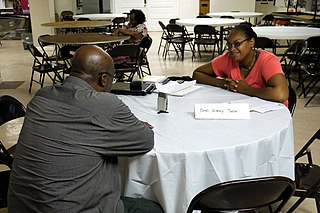
Oral history is the collection and study of historical information about individuals, families, important events, or everyday life using audiotapes, videotapes, or transcriptions of planned interviews. These interviews are conducted with people who participated in or observed past events and whose memories and perceptions of these are to be preserved as an aural record for future generations. Oral history strives to obtain information from different perspectives and most of these cannot be found in written sources. Oral history also refers to information gathered in this manner and to a written work based on such data, often preserved in archives and large libraries. Knowledge presented by Oral History (OH) is unique in that it shares the tacit perspective, thoughts, opinions and understanding of the interviewee in its primary form.

Rigoberta Menchú Tum is a K'iche' Guatemalan human rights activist, feminist, and Nobel Peace Prize laureate. Menchú has dedicated her life to publicizing the rights of Guatemala's Indigenous peoples during and after the Guatemalan Civil War (1960–1996), and to promoting Indigenous rights internationally.
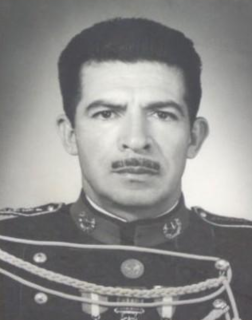
José Efraín Ríos Montt was a Guatemalan military officer and politician who served as de facto President of Guatemala in 1982-83. His brief tenure as chief executive was one of the bloodiest periods in the long-running Guatemalan Civil War. Ríos Montt's counter-insurgency strategies significantly weakened the leftist Guatemalan National Revolutionary Unity (URNG) guerrilla, while also leading to accusations of war crimes and genocide perpetrated by the Guatemalan Army under his leadership.
Kʼicheʼ are indigenous peoples of the Americas and are one of the Maya peoples. The Kʼicheʼ language is a Mesoamerican language in the Mayan language family. The highland Kʼicheʼ states in the pre-Columbian era are associated with the ancient Maya civilization, and reached the peak of their power and influence during the Mayan Postclassic period.

The Maya peoples are an ethnolinguistic group of indigenous peoples of Mesoamerica. The ancient Maya civilization was formed by members of this group, and today's Maya are generally descended from people who lived within that historical civilization. Today they inhabit southern Mexico, Guatemala, Belize, El Salvador and Honduras. "Maya" is a modern collective term for the peoples of the region, however, the term was not historically used by the indigenous populations themselves. There was no common sense of identity or political unity among the distinct populations, societies and ethnic groups because they each had their own particular traditions, cultures and historical identity.

SIL International is a Christian non-profit organization, whose main purpose is to study, develop and document languages, especially those that are lesser-known, in order to expand linguistic knowledge, promote literacy, translate the Christian Bible into local languages, and aid minority language development.
General Fernando Romeo Lucas García was the 37th President of Guatemala from July 1, 1978 to March 23, 1982. He was elected as Institutional Democratic Party candidate. Elections for his presidency were fraud-ridden. During Lucas García's regime, tensions between the radical left and the government increased. The military started to murder political opponents while counterinsurgency measures further terrorized populations of poor civilians.
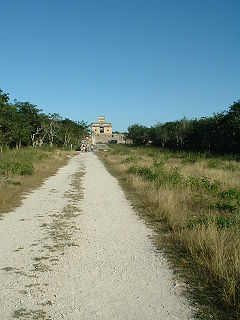
A sacbe, plural sacbeob, or "white way", is a raised paved road built by the Maya civilization of pre-Columbian Mesoamerica. Most connect temples, plazas, and groups of structures within ceremonial centers or cities, but some longer roads between cities are also known. The term "sacbe" is Yucatec Maya for "white road"; white perhaps because there is evidence that they were originally coated with limestone stucco or plaster, which was over a stone and rubble fill.

Santa Maria Nebaj is a town and municipality in the Guatemalan department of El Quiché. Santa Maria Nebaj is part of the Ixil Community, along with San Juan Cotzal and San Gaspar Chajul. Native residents speak the Mayan Ixil language.
Elisabeth Burgos-Debray is a Venezuelan anthropologist, former wife of the French philosopher Régis Debray, as well as the editor of Rigoberta Menchú's controversial autobiography I, Rigoberta Menchú. She was director of the Maison de l'Amerique Latine in Paris and of the Institut Cultural Français in Seville.

The Ixil Community is a name given to three neighbouring towns in the Quiché department in the western highlands of Guatemala. These towns are Santa Maria Nebaj, San Juan Cotzal, and San Gaspar Chajul. The area's population is predominantly of Ixil descent. When viewed on a map, the three Ixil towns appear to form a triangle, because of this, the Guatemalan military used the term Ixil Triangle when planning its campaigns in this region. Although the term "Ixil Triangle" has been used in some popular handbooks., most people in the region, as well as scholars and indigenous rights activists, avoid using this term as it reproduces the military "gaze", and instead prefer "Ixil region" or "Ixil community."
Matthew Restall is a historian of Colonial Latin America. He is an ethnohistorian and a scholar of the conquest, colonization, and the African diaspora in the Americas. Restall has areas of specialization in Yucatan and Mexico, Guatemala, and Belize. He is a member of the New Philology school of colonial Mexican history and the founder of a related school, the New Conquest History. He is currently Edwin Erle Sparks Professor of Latin American History and Anthropology, and Director of Latin American Studies, at the Pennsylvania State University. He is a former president of the American Society for Ethnohistory (2017-18), a former editor of Ethnohistory journal, a senior editor of the Hispanic American Historical Review, editor of the book series Latin American Originals, and co-editor of the Cambridge Latin American Studies book series. He also writes on the history of popular music.
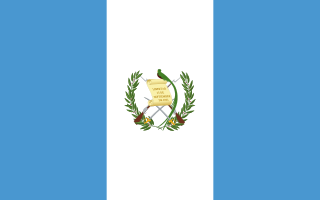
Guatemala, officially the Republic of Guatemala, is a country in Central America bordered by Mexico to the north and west, Belize and the Caribbean to the northeast, Honduras to the east, El Salvador to the southeast and the Pacific Ocean to the south. With an estimated population of around 17.2 million, it is the most populous country in Central America and is the 11th most populous country in the Americas. Guatemala is a representative democracy; its capital and largest city is Nueva Guatemala de la Asunción, also known as Guatemala City, the largest city in Central America.
Founded by Pamela Yates, Peter Kinoy and Paco de Onís in 1981, Skylight is a human rights media organization based in Brooklyn, NY that has been making feature-length documentaries and short digital projects for over 30 years. Skylight is a member of New Day Films.
Arturo Arias is a Guatemalan novelist and critic. His early life was marked by the overthrow of democracy in 1954, and the ensuing military dictatorships and civil rebellions. These experiences, along with a visit to refugee camps on the Guatemala-Mexico border in 1982, sparked his dedication to human and Indigenous rights and inspired his scholarly research.
The Burning of the Spanish Embassy refers to the occupation of the Spanish Embassy in Guatemala City, Guatemala, on January 31st, 1980, by indigenous peasants of the Committee for Peasant Unity and their allies and the subsequent police raid that resulted in a fire which destroyed the embassy and left 36 people dead. The incident has been called "the defining event" of the Guatemalan Civil War. Spain terminated diplomatic relations with Guatemala as a result.
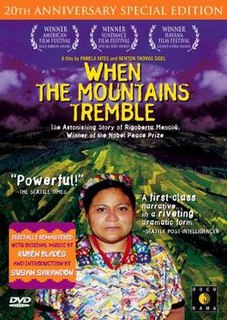
When The Mountains Tremble is a 1983 documentary film produced by Skylight Pictures about the war between the Guatemalan Military and the Mayan Indigenous population of Guatemala.

Greg Grandin is a professor of history at Yale University. He previously taught at New York University. He is author of a number of books, including Fordlândia: The Rise and Fall of Henry Ford's Forgotten Jungle City, which was a finalist for the Pulitzer Prize for History, as well as for the National Book Award and a National Book Critics Circle Award. A more recent book, entitled, Who Is Rigoberta Menchú?, focuses on the treatment of the Guatemalan Nobel Peace Prize winner. His 2014 book, The Empire of Necessity: Slavery, Freedom, and Deception in the New World, is a study of the factual basis for the novella Benito Cereno by Herman Melville.

Mayan Renaissance is a 2012 American documentary film by director Dawn Engle about the Maya peoples of Guatemala and Central America. It describes the ancient Maya civilization, the conquest by Spain during the 1520s, hundreds of years of oppression, and the modern struggle by Mayans for self-determination and a Mayan renaissance.











